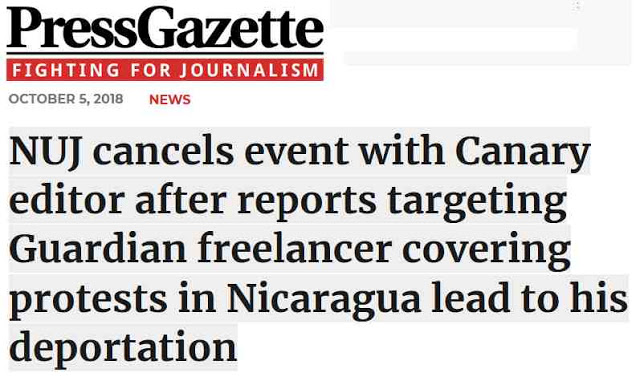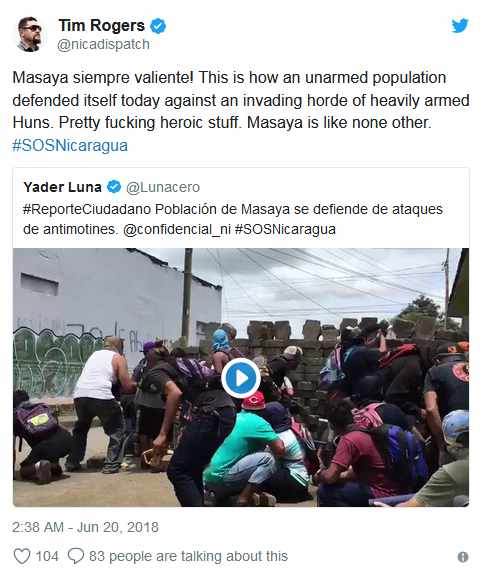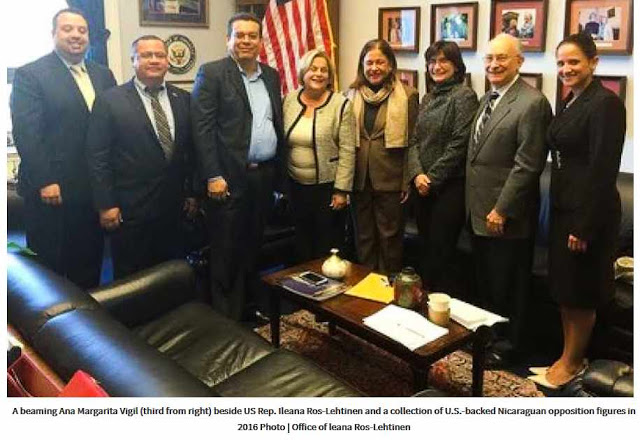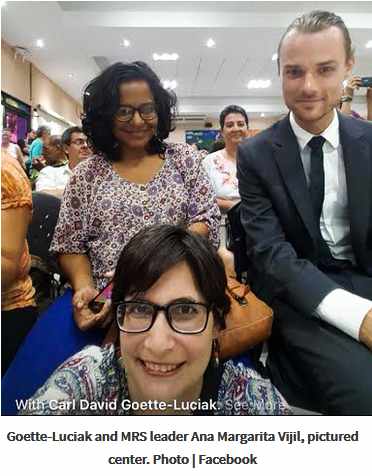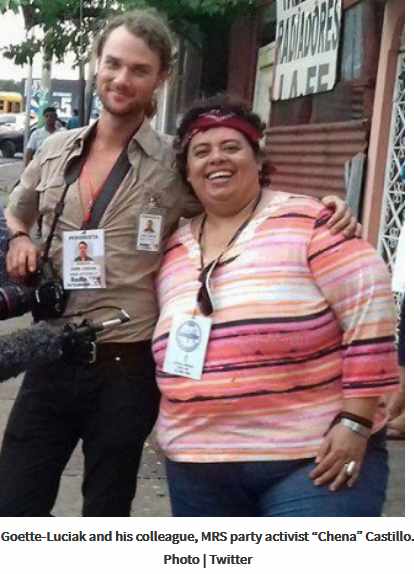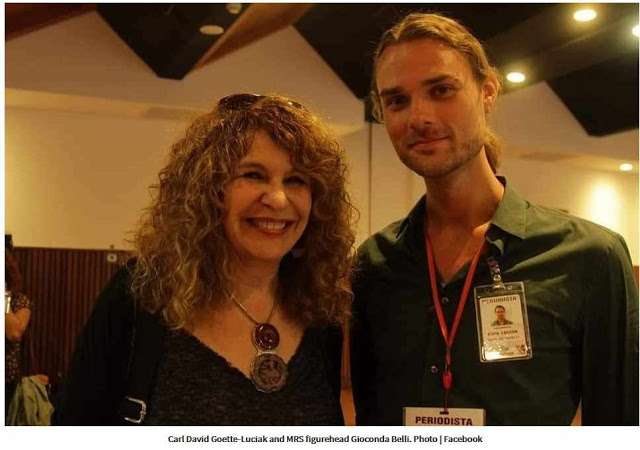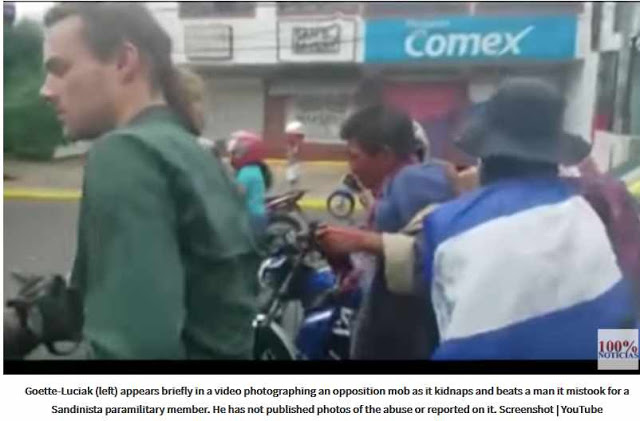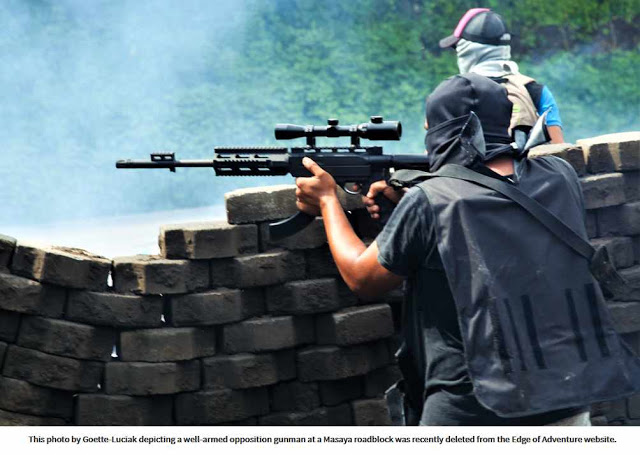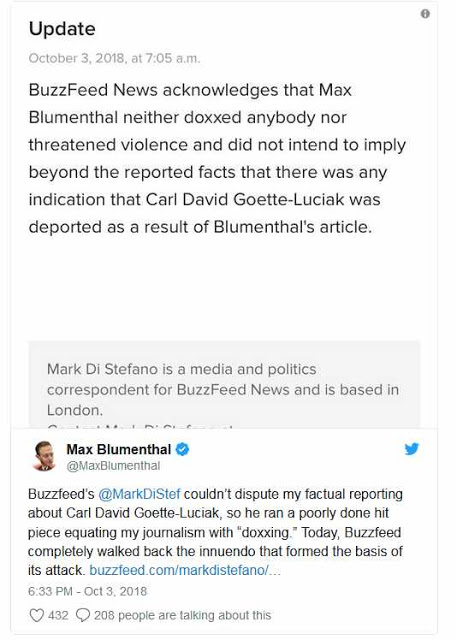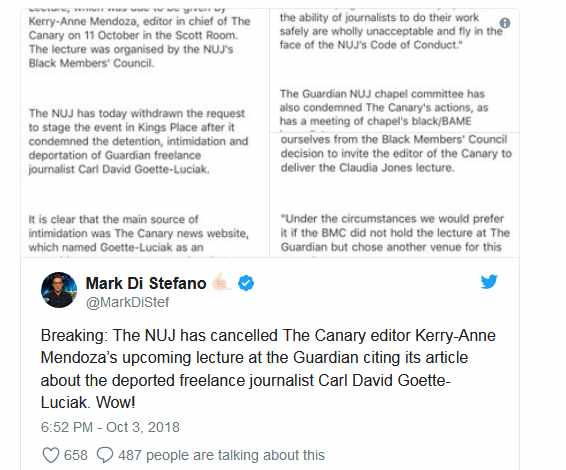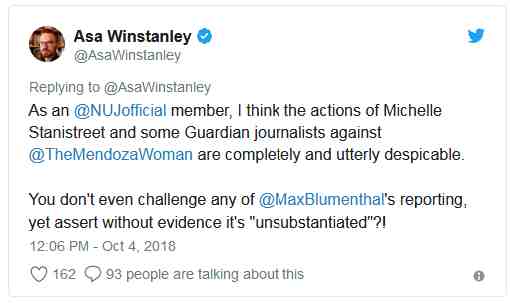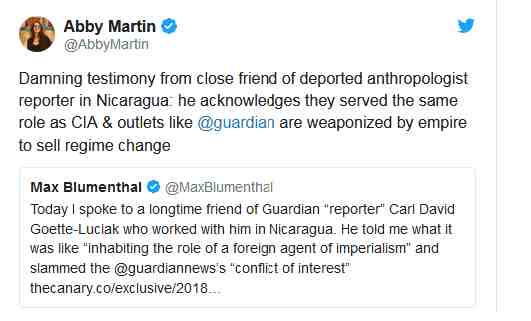journalist the PR man for the American Backed Opposition in Nicaragua
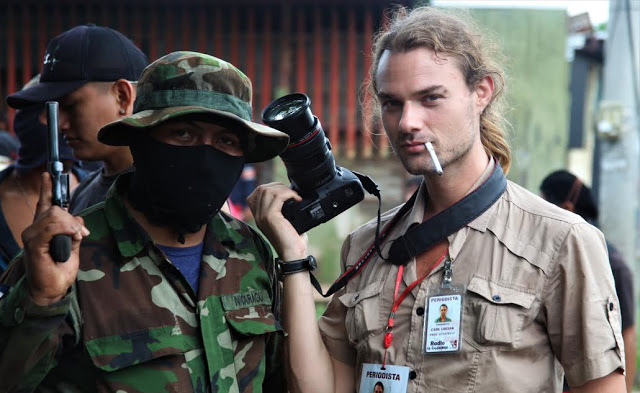 |
| The Guardian’s Carl David Goette-Luciak posing with an armed US backed terrorist |
Nicaraguan authorities deported Carl David Goette-Luciaka, a Guardian
journalist who had become embedded with the armed American-backed
Opposition. The article fulminated against the journalist
and blogger, Max Blumenthal:
written an article for Canary entitled Investigation slams Guardian cooperation with novice reporter
linked to US regime-change machine
on Goette-Luciaka’s deportation the Guardian fulminated:
Blumenthal later published a lengthy, insinuation-infused attack on the
journalist that admitted “there is no evidence that Goette-Luciak is an asset
of the CIA or any other US agency”.
Blumenthal, who conducted an unquestioning interview with Ortega this year and has been criticised for his
reporting on the Nicaraguan crisis, painted Goette-Luciak as a “novice
reporter” acting as a “publicist” for a Nicaraguan opposition that was set on
regime change.
of this article a lawyer for Blumenthal contacted the Guardian to emphasise
there was nothing to suggest his reporting contributed to
the deportation of Goette-Luciak.
Despite
the protests
of Adam Barnett and others at the suggestion that deported journalist Carl
David Goette-Luciak was operating in Nicaragua on behalf of the United States,
it is a fact that western journalists have often doubled up as CIA operatives.
This is in addition to the practice of western journalists being ‘embedded’
with US troops in Iraq.
with long memories will remember the former head of the BBC World Service, John
Tusa, who also doubled up as the main front man of the CIA’s Forum World Features
news service.
Sandanista government led by Daniel Ortega has been under attack from a US
backed-insurgency for the past 2 years. This is nothing new. When the Sandanistas first
took power in 1979 and overthrew the Somoza dictatorship they almost
immediately faced a US sponsored war from the Reagan backed contras.
removed from power in the 1990 elections the Sandanista FSLN regained power in
2006 and have been in office ever since. Today they faced a US backed opposition
and that is where the Guardian’s ‘journalist’ Carl David Goette-Luciak comes
in.
first became aware of the controversy when I read that a lecture by Canary
Editor, Kerry-Anne Mendoza, at the Guardian, as part of Black History Month had
been cancelled. The Press Gazette covered this .
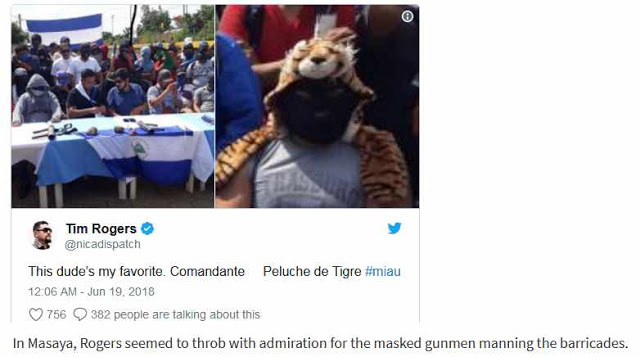 |
| Tim Rogers was another ‘journalist’ operating alongside Luciak |
reported that the NUJ had cancelled its annual Black History Month lecture
after Mendoza ‘published reports
attacking a Guardian freelancer working in Nicaragua as part of a “smear
campaign” that led to his deportation.’ According to the Gazette Goette-Luciak
had been covering protests calling for Nicaragua’s President, Daniel Ortega, to
step down. ‘Hundreds have been killed in
a violent government crackdown issued in response, which the NUJ says has also
targeted journalists documenting the protests.’
Grayzone Project and a
well-known Jewish anti-Zionist, has written extensively on Goette-Luciak. .
September 26th, in an article for Mint Press News How
an American Anthropologist Tied to US Regime-Change Proxies Became the MSM’s
Man in Nicaragua Blumenthal described how
The Washington Post, the BBC and NPR have assigned an American anthropologist with no previous journalistic experience’
who ‘has published pieces littered with
falsehoods that reinforce the opposition’s narrative promoting regime change
while relying almost entirely on anti-Sandinista sources.’
to Blumenthall Goette-Uciak
under journalistic cover’ and has ‘operated
side-by-side with activists from a U.S.-backed opposition party known as the
Sandinista Renovation Movement, or MRS.’
funded, as is par for the course in Latin America with counter revolutionary movements,
with millions of dollars of US government assistance. All in the name of
democracy of course! Blumenthall described how the Guardian, NPR and The
Washington Post
arbiters of truth in an era of fake news. However, in countries where
Washington is pushing regime change, these same outlets have dispatched a corps
of writers to embed with U.S.-backed opposition elements, provide them with
publicity, and sell their goals back to the American public. Goette-Luciak is
one of clearest embodiments of the disturbing trend.’
know from our experience in Britain how the Guardian has functioned as the main
instrument of the campaign to overthrow Jeremy Corbyn. The site five filters
has documented how over the
past 3 years there have been literally hundreds of anti-Corbyn articles in what
used to be considered a left of centre newspaper. There is little doubt that
via senior editor Jonathan Freedland, the Guardian has become the main conduit for
false information from British and Israeli intelligence sources.
paints a damning picture of the Guardian’s man with the Sandanista opposition. On
September 7, Goette-Luciak published an article in the Guardian claiming that the country
had been brought to a virtual halt by a general strike. His co-author was
Caroline Houck, a
staff correspondent for the website Defense One, which is funded by the arms
industry to “provide news, analysis and
ideas for national security leaders and stakeholders.”
Mejia highlighted
several pieces of misinformation in the article. Contrary to the claim that the
Civic Alliance interrupted the country’s economy with its general strike,
Managuan marketplaces were bustling that day and commerce proceeded as usual.
government plotted to prevent Ortega’s election. A September 6, 2006 U.S.
embassy cable entitled, “MRS: We Want To Bring Ortega Down” laid
out some of those plans. Authored by U.S. Ambassador Paul Trivelli, it described
a meeting between Trivelli and Israel Lewites, the nephew of MRS presidential
candidate Herty Lewites.
and observation” in Nicaragua’s 2006 election, two dollars for every
Nicaraguan citizen to defeat Ortega. A separate leaked diplomatic cable detailed a meeting during that
election campaign between MRS co-founder Dora Maria Tellez and Trivelli.
victory and wound up reaching out to the U.S. as its domestic support base
collapsed. In 2016, the MRS’s Vijil joined a delegation to lobby in Washington
for the Nica Act, a bill proposing crushing sanctions on her country.
alongside a cast of U.S.-backed activists and Rep. Ileana Ros-Lehtinen, a
neoconservative Cuban-American Republican who was the main author of the sanctions bill.
described Vijil as “national director of
the outlawed Sandinista Renovation Movement (MRS).” In fact the MRS had not
been “outlawed;” its candidates had garnered a pitiful 1.3 percent of the
popular vote in the last election.
claiming that, “[w]ith 200 political
prisoners and [new] murders every day, this strike is just one more sign that nothing
is normal here in Nicaragua.” What Goette-Luciak and his co-author failed
to mention was that those recent murders have consisted largely of Sandinista
supporters. The recent murder victims include Lenin Mendiola, an FSLN militant and son of two revered
Sandinista historical figures, Benigna Mendiola and Bernardino Díaz Ochoa.
Goette-Luciak was of his relationship with his source and her party, which has
enjoyed direct support from the U.S. government. Vijil is the former president
of the MRS and has served as a fellow
of the Central American Leadership Initiative at the Aspen Institute, a hub of
neoliberal thought funded by the Ford Foundation and Rockefeller Brothers Fund,
among others.
before the coup erupted in April, Vijil was in Washington for a “high level executive meeting,” Goette-Luciak
has been connected with the MRS most directly through Azucena Castillo, a
prominent party activist whom he lists as his employer at Radio
Ciudadana. Blumenthall states that although
that Goette-Luciak is an asset of the CIA or any other U.S. agency. However,
his advancement of Washington’s divisive political objectives during the course
of his ethnographic fieldwork represented a fairly clear example of dual-use
anthropology.’
him of operating as a U.S. intelligence asset. The Edge of Adventure promptly deleted its podcast interview with him and scrubbed most of his photos from the site. Goette-Luciak then began cleaning up
his own Facebook page, deleting his selfies with MRS party leaders.
was in the thick of the most intense fighting between opposition gunmen and
Sandinista-aligned forces. Masaya was a city which the opposition had seized
and cordoned off entire neighborhoods in an attempt to declare a junta.
campaign of terror against Sandinista supporters, burning their homes, kidnapping, beating, torturing and even killing them, while laying siege to the local police
station. In one of the most gruesome incidents, an unarmed community police
officer named Gabriel Vado was kidnapped by opposition gunmen, dragged to death
from the back of a truck, and torched on camera while slumped before a
roadblock.
the opposition’s ongoing campaign of terror in Goette-Luciak’s June 23 report for The Washington Post, which he
co-authored with Houck. Instead, Goette-Luciak painted the gunmen as valiant
resistance fighters and promoted their call for the U.S. to send them heavy
weapons: “Several asked a reporter
whether President Trump would send support to the resistance,” he wrote.
figures like Goette-Luciak as correspondents for Western publications cannot be
viewed as an aberration or mistake. In Nicaragua, as in so many other countries
targeted with regime-change operations, outlets like the Guardian, New
York Times and Washington Post seem to demand on-the-ground coverage
that reinforces the regime-change agenda.
credentialed opposition publicists as journalists, instilling in them the
illusion of their own professionalism. “I
think I’ve come to realize the value of objective and impartial journalism,”
Goette-Luciak said in his Edge of Adventure interview, “and I no longer consider myself as an activist for or against any
particular cause.”
an interview with Wyatt Reed, a long-time friend of Goette-Luciak, Reed
admitted that there was “a straightforward
conflict of interest involved in what we were doing”. In particular a disturbing video showed
Goette-Luciak filming opposition thugs torturing and kidnapping an elderly
squatter they accused of Sandinista sympathies, raising the question of why he
did and said nothing about it. Indeed, he did not mention the incident in any
of his reports for the Guardian or Washington Post.
Goette-Luciak who traveled and worked alongside him in Nicaragua, and who has
undergone a crisis of conscience since witnessing the US-backed
coup ravage the country this year.’
Reed admitted that there was ‘a straightforward conflict of
interest involved in what we were doing, and [his] coming to terms with that” had motivated him to go public with his misgivings. He said that, since
leaving Nicaragua, he had begun “slowly
realizing the way in which I was inhabiting the role of a foreign agent of
imperialism in many ways, even if I wasn’t being paid or compensated for it”.
publications like the Guardian assigned his friend to cover Nicaragua’s
conflict:
publications have to be aware that you did just legitimise this figure
overnight and that he’s pretty clearly getting along with the opposition and
not making any pains to reach out to any of the supporters of the government,
which is inexplicable. There are massive marches of tens of thousands of
government supporters and you couldn’t find anybody to say something in support
of the government? I find that difficult to believe. It makes it clear that
[publications like the Guardian] are not interested in getting to the
truth but in replicating a narrative that, if history is any guide, they’ve
already performed in numerous cases in Latin America.
kind of journalism from the Guardian no longer surprises people. Long gone are
the days when a committed anti-imperialist such as Richard Gott reported
from Latin America for the Guardian.
Today under Freedland’s baleful influence, the Guardian is in the camp
of US imperialism.
submitted a letter outlining his concerns about Goette-Luciak to the Guardian,
the Washington Post, and the National Union of Journalists. These
organizations have so far refused to publish it. The full text of the letter is
below.
editor,
friend and former collaborator of your correspondent with the Nicaraguan
opposition, I feel compelled to make a few points clear in light of the recent
media frenzy over the deportation from Nicaragua of Carl David Goette Luciak. I
must be extremely clear: in the six months we lived and worked together in
Nicaragua we were both very open about our plan to use our friendships with
Nicaraguan opposition figures to push for the end of the Sandinista government
and create careers for ourselves as journalists or consultants in the process.
We were not CIA—but we were in many ways serving its same historical purpose.
stress that I wish no ill will on Carl David. I’ve known him since middle
school, we were best friends for much of our lives, and I want only to set the
record straight. Having already spent several years in Nicaragua, I had made
connections with multiple prominent antigovernment groups at the time of our
partnership. And since I introduced him to many of them, I feel compelled to
state publicly that any notion we had of being impartial and objective
journalists was simply a lie. We arrived together in Managua in January 2016
without prior journalistic experience but with a shared understanding that the
Nicaraguan government represented a fundamental betrayal of socialist ideals,
and the shared understanding that the ruling Sandinista party needed to be
removed from power.
since, I’ve come to understand that regardless of our personal feelings on the
Nicaraguan president or government, any illusions we had of being uniquely
capable of helping the Nicaraguan people achieve self-determination were
ultimately founded in a kind of white savior complex. I left, realizing
Americans cannot liberate the Nicaraguan people. Not thirty years ago, when the
US government created the Contra army to fight a decade long war against
socialist Nicaragua, and not now. Americans can only help destroy their
government, and in the process hand power over to the same conservative
neoliberals who seek to roll back the Nicaraguan safety net, privatize national
resources, and undo a decade of improvements in poverty reduction and
healthcare.
disagreements with the Sandinista party. However, I do not feel that the
violent overthrow of their government can in any way benefit working class
Nicaraguans. I mourn with them the tragic deaths of the hundreds killed in the
gunfights between police and armed opposition. But if the Sandinista government
falls we must ask ourselves: how many tens of thousands more will die when the
health clinics are closed? How many children will go barefoot, hungry, and
uneducated if their welfare state is abolished? They can’t just fly back to the
United States. Unlike them, the westerners who bring about “regime change”
rarely have to stick around and suffer the consequences.
1 October, Nicaraguan authorities deported Goette-Luciak, an
anthropologist-turned-reporter who had published a series of factually
flawed reports in the Guardian and Washington Post that
reinforced the narrative of the country’s opposition forces.
The journalistic establishment lost no time in
striking back with Adam Barnett’s piece in politics.co.uk The Canary is not
journalism – it’s a government mouthpiece in waiting
describes
itself as
UK’s leading political news website among MPs and members of the public.. (its)
team of journalists produce their stories from deep within the corridors of
power in Westminster, where they were the first digital journalists to gain
access to the lobby.’
incestuous pundits reporting each others prejudices as news.
is a right-wing Labour supporter who formerly worked for Left Foot Forward a blog established by
Will Straw, son of Jack. Some inkling of where Barnett is coming from with his attack
on Blumenthall and Canary can be gauged from the following:
 |
| Picket of Labour’s National Executive over their ‘entirely accurate’ witchhunt of anti-racists |
website had just endorsed boycotting the paper [Guardian] over its entirely
accurate coverage of anti-semitism in the Labour party.’
Entirely
accurate? All the smears of anti-Semitism are directed at the supporters of Jeremy
Corbyn and the constant attacks are of course without any right of reply. The portrayal of those
of us expelled or suspended as ‘anti-Semites’ despite our long history of
antiracism and anti-fascism is a collective libel. The portray of the Israeli penetration of the Labour
Party as some kind of socialist endeavour and the misinformation concerning the
IHRA confirms that the Guardian’s coverage is anything but accurate.
Lens reported
that Patrick Elliot described
how the first story ever to be published in a UK national newspaper with
the words ‘Corbyn’ and ‘antisemitism’ in the same sentence appeared
in the Guardian on August 13, 2015.
wrote that ‘Mendoza was invited to the
now scrapped event at the Guardian by the NUJ’s Black Members Council for Black
History Month. It’s not clear whether they will host her talk at another venue
instead.’ The Guardian’s NUJ Chapel’s decision was both racist and
reactionary. There can be no doubt that Goette-Luciak was operating as a
propagandist for the US backed opposition in Nicaragua, a country that has had
more than its fair share of US backed destabilisation under Reagan and his
successors.
can gain some measure of where Barnett is coming from with his hysterical attack
on Canary. He writes that:
press. They are the aspirant state media for a future autocracy. If they will
help governments defame journalists in other countries, and shrug when those
journalists are arrested, imagine what they would do to people here who they
actually know and dislike.
journalists who need police protection from zealous Corbynites. It already
says its leader is the victim of various conspiracies. One such yarn even
resulted in the head of a PR firm receiving death
threats for his alleged complicity.’
Open Democracy sees fit to publish this reactionary patsy.
Left – The Guardian cancels lecture by The Canary’s Mendoza after Nicaragua
article reporting that Buzzfeed News published an article, with comment
from the Committee to Protect Journalists (CPJ), accusing Blumenthal of writing
a piece for the Canary which doxxed and incited violence against Goette-Luciak.
Blumenthal rebuffed the claims, stating: “Goette-Luciak had been
exposed in Nicaragua for his work with the opposition, and would have been sent
home (not detained) whether or not I wrote anything.”
saying “Blumenthal neither doxxed anybody nor threatened
violence.” Doxxing is the practice of researching and
broadcasting private or identifiable information.
Di Stefano then reported that, due to the Blumenthal article, the Guardian has
withdrawn their invitation for Mendoza to give the Claudia Jones Memorial
lecture.
The email written by Phillip Inman, an economics writer at the Guardian states
the “detention, intimidation and deportation” of
Goette-Luciak was mainly due to, RT contributor, Blumenthal’s article for the
Canary – originally published in MintPress News.
intimidation was The Canary news website, which named Goette-Luciak as an
opposition stooge – an accusation that quickly led to his arrest and
deportation.”
the anti-government protests. The paper revealed Goette-Luciak had been
arrested on Monday by Nicaraguan law enforcement officials and was escorted on
to a flight from the Nicaraguan capital to San Salvador in El Salvador later
that afternoon from where he was deported.
Mendoza was scheduled to give a lecture as part of the Claudia Jones Memorial
on October 11, at Guardian HQ in London. Jones was a Trinidad-born journalist
and activist. She migrated to the US with her family as a child and later
became a political activist and black nationalist through Communism. She died
in London in 1964.
National Union of Journalists, pulled the meeting as a result of the false
allegation that the Canary was responsible for the deportation of Goette-Luciak. See How
many privileged columnists does it take to silence one Black woman?
